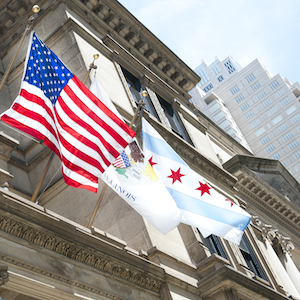Mayor Lightfoot’s 2022 budget proposal unveiled on September 20 provides significant new resources to address homelessness. The new funding is included in her Chicago Recovery Plan which allocates the Local Fiscal Recovery Fund dollars included in the American Rescue Plan Act (ARPA). This initial investment is proof that organizing works. CCH and its partners Right to Recovery, Bring Chicago Home, and the Chicago Continuum of Care have coordinated town halls, community meetings and been on the ground across the city to ensure that these funds are used to help Chicago recover.
While we are heartened to see resources allocated toward such a crucial issue for our city, these funds are one-time, and are by no means sufficient to adequately address the problem we face. The homelessness crisis is a result of decades of failed policies, and will not be solved in one budget. The proposal made by the Bring Chicago Home coalition would help an estimated 45,000 Chicagoans experiencing homelessness secure or maintain affordable housing over the course of 10 years. Therefore, we continue to call for the creation of a dedicated revenue stream, for which we await the mayor’s support.
The mayor’s proposal for new funding to combat homelessness from Local Fiscal Recovery dollars total $117 million and include:
- $35 million for permanent supportive housing
- $30 million for conversion of hotels to permanent supportive housing
- $20 million for rapid rehousing to provide short-term rental subsidies to quickly exit homelessness
- $20 million for shelter infrastructure including conversion of shelters to non-congregate settings
- $12 million for behavioral health services to keep high utilizers of emergency services stable in housing
In addition, the plan allocates $25 million to address gender-based violence including housing and services.
This $117 million is in addition to $71 million in HOME funds from the ARPA which must be used to address homelessness as well as nearly $26 million in corporate and dedicated homeshare funding for homelessness and gender-based violence. The corporate funding has increased by $2 million since last year. This brings the total assistance for homelessness in 2022 to $214 million.
The mayor’s budget also dedicates $157 million for affordable housing, but the publicly available information does not specify any income targets and does not clarify how many units will be new versus upgraded, so it is unclear if any of that funding would benefit people experiencing homelessness.
We are very encouraged to see that the mayor responded to advocacy from Bring Chicago Home, Right to Recovery and the Chicago Continuum of Care and added this significant new revenue to address Chicago’s homelessness crisis. However, this spending does not negate the need for long-term dedicated revenue that could be generated by increasing the city’s real estate transfer tax on properties over $1 million, as advocated by Bring Chicago Home.
This is a one-time influx of funding, but services and subsidies for permanent housing will need to be maintained on an ongoing basis. In addition, the funding provided through the Local Fiscal Recovery fund will only generate 150-230 permanent supportive housing units, while the city’s own document reports CCH’s 2019 estimate that there were over 58,000 people experiencing homelessness in Chicago before the pandemic and that number is only expected to grow.
In addition, we believe that rather than an increase in funding for the Chicago Police Department, there should be an increase in funding for a non-police response that focuses on supports and treatment, as we know that this is a critical strategy for safely engaging people experiencing homelessness and then connecting them with proper resources.
We also welcome the inclusion of a Universal Basic Income pilot program, as championed by Alderman Gilbert Villegas. This pilot should be grounded in tested models that have proven effective in other parts of the country.
Finally, we call on Mayor Lightfoot and the City Council to support the Bring Chicago Home campaign and pass a resolution to put a question on the ballot to allow the city to increase the real estate transfer tax. Without this dedicated source of funding, we will continually respond to homelessness on an emergency basis instead of moving towards a permanent solution.


